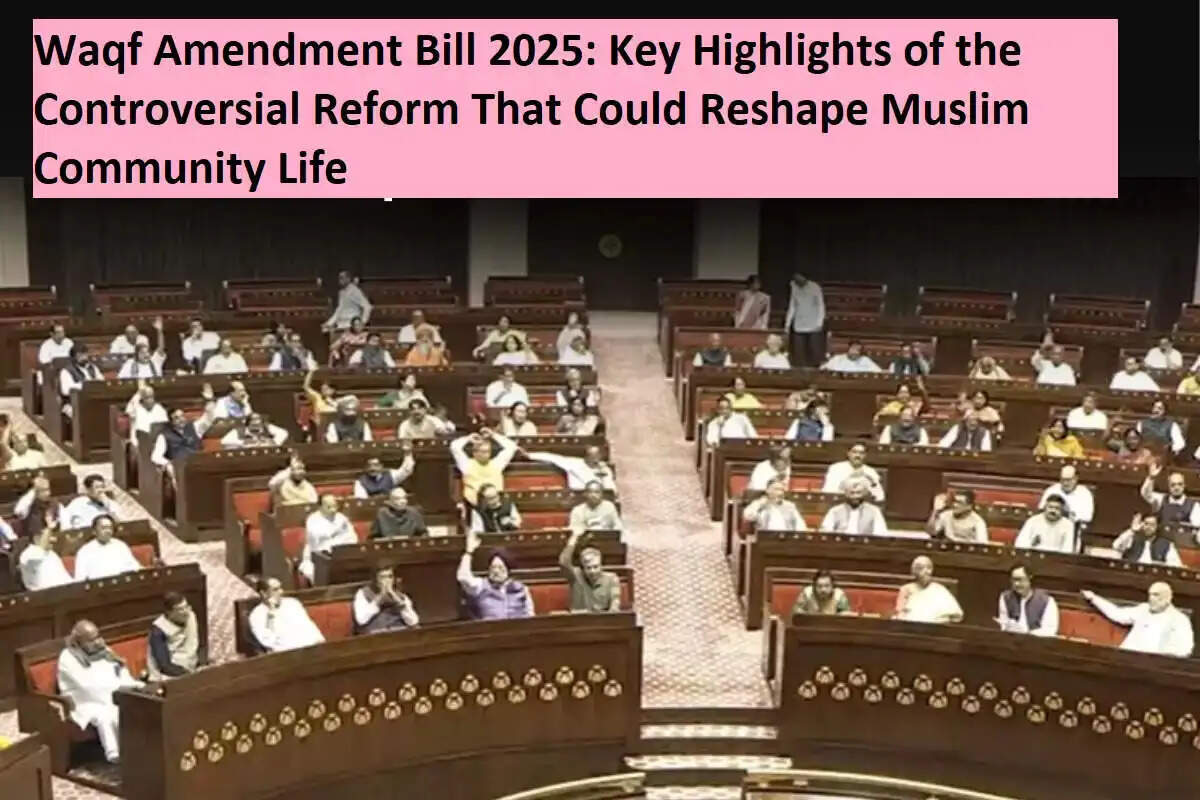Waqf Amendment Bill 2025: A Controversial Shift in India's Religious Landscape
Nationwide Debate Over the Waqf Amendment Bill 2025

The Waqf Amendment Bill 2025 has ignited a significant discussion across India, transcending political and community boundaries. Having passed through both houses of Parliament, it now awaits the President's approval. Responses to the bill have been polarized, with many Muslims expressing concerns about its potential effects, while others advocate for it as a crucial step towards enhanced accountability and transparency in the management of Waqf properties.
Understanding the implications of this bill is essential, even for those outside the Muslim community, as it could reshape the social and economic fabric for millions of Indian citizens.
Understanding Waqf
What Is Waqf?
Waqf is a charitable endowment established under Islamic law, typically involving the donation of property or land for religious or social welfare purposes. Once donated, the asset becomes non-transferable and is intended to benefit the public, often through mosques, madrasas, or community welfare initiatives.
Controversies Surrounding the Waqf Amendment Bill
Why Has the Waqf Amendment Bill Caused Uproar?
The Waqf Amendment Bill 2025 has stirred political tensions and community unease. Opposition parties, including the Congress and AIMIM, led by notable figures like Mohammed Javed and Asaduddin Owaisi, have challenged the bill in the Supreme Court, labeling it unconstitutional. Protests have erupted in various regions across the country.
Despite the criticism, the Modi government asserts that the bill aims to address long-standing loopholes and curb the misuse of Waqf properties, many of which are reportedly mismanaged or illegally occupied.
Key Provisions of the Bill
Major Provisions and Their Impact
1. Crackdown on Illegal Occupation of Waqf Properties
The bill grants authorities the power to take decisive action against unauthorized occupants of Waqf land. Imam Sajid Rashid has praised this provision, highlighting that influential individuals have historically exploited valuable Waqf assets. Under the new regulations, such occupants may face eviction or be required to pay fair-market rent, aiming to redirect resources back to the underprivileged Muslim community.
2. Abolition of the “By-User” Clause
One of the most contentious aspects is the elimination of the “by-user” provision, which previously allowed individuals using a property for an extended period to claim ownership. Critics, including Mohammed Faizi from the Jharkhand Sunni Waqf Board, argue that many community members lack proper documentation, and this change could lead to the loss of legitimate Waqf assets. Conversely, supporters believe it will safeguard properties from fraudulent claims.
3. Mandatory Registration and Online Listing of Waqf Properties
To enhance transparency, the bill requires all Waqf properties to be registered and accessible through a centralized online database. This digital record-keeping aims to prevent corruption, mismanagement, and unauthorized transfers, while public access to this information could empower community members to report any discrepancies or misuse.
4. Legal Recourse for Property Disputes
Previously, contesting the classification of a property as Waqf was legally challenging. The amended bill now allows individuals with legitimate concerns to seek legal recourse through revenue courts, civil courts, and even High Courts. This change ensures that decisions are not made unilaterally by Waqf boards without appropriate judicial oversight.
5. Safeguarding Women’s Inheritance Rights
A progressive feature of the bill is its protection of women’s rights to inherit property. It prevents properties from being donated to Waqf in a manner that circumvents rightful female heirs, promoting gender justice in property inheritance.
6. Eligibility Clause for Donors
To mitigate potential misuse, the bill stipulates that only individuals who have identified as Muslim for at least five years can legally establish a Waqf. This provision is intended to ensure that endowments are made with genuine intent and within the community's religious framework.
Conclusion
Final Thoughts
The Waqf Amendment Bill 2025 represents a significant reform with extensive implications for India's Muslim community. While critics express concerns about overreach and the erosion of traditional rights, supporters view it as a necessary step to revitalize the Waqf system and restore its original charitable mission.
As the bill awaits final approval from President Droupadi Murmu, the national dialogue continues to intensify. Whether you are directly impacted by the bill or simply a concerned citizen, it is crucial to remain informed about this pivotal moment in India's legal and religious landscape.
